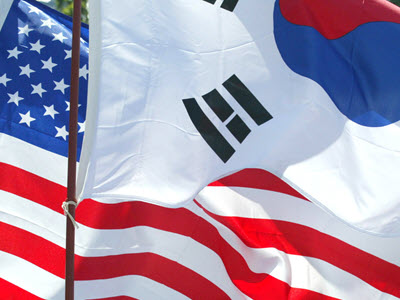How to Enhance the U.S.-ROK Alliance through Economic Security Policy
Wonho Yeon argues that both the U.S. Congress and the Korean National Assembly should support cooperative efforts to enhance economic security and ensure that such a vision can be implemented in domestic regulations and policies over the long term. This commentary is part of the roundtable “Updating the U.S.-ROK Alliance for New Frontiers.”
On April 26, 2023, Presidents Joe Biden and Yoon Suk-yeol commemorated the 70th anniversary of the alliance between the United States and the Republic of Korea (ROK) and presented a new vision for the alliance’s future. Both countries affirmed that the U.S.-ROK alliance will move beyond the Korean Peninsula to become a global alliance and that it will function comprehensively not only in security but also in other domains such as the economy, technology, culture, and human resources.
Yoon’s state visit to the United States can be considered a success, given that the president’s approval rating rebounded in the polls immediately after his visit. The biggest achievement of Yoon’s visit to the United States was the Washington Declaration, which contains U.S. extended deterrence commitments to South Korea and the establishment of a new U.S.-ROK Nuclear Consultative Group.
From the general view of the Korean public, however, there was a sense of disappointment that more tangible economic outcomes did not result. There were no concrete agreements on the U.S. Inflation Reduction Act (IRA), the CHIPS and Science Act, or export controls on semiconductor equipment, which have a significant impact on the Korean economy. Biden and Yoon only reaffirmed more fundamental principles, including their intention for the two governments to continue close consultations to create a more predictable and favorable business environment.
Because the U.S. government released IRA tax credit guidelines and new CHIPS Act subsidy review criteria and guardrail guidelines just prior to the summit, it may have been unrealistic to expect a concrete agreement to be announced at this summit. Nonetheless, we can read Yoon’s emphasis on economic “reciprocity” in his address to Congress, and Biden’s expressed interest in working together to ensure that the IRA and the CHIPS Act are more an opportunity than a hindrance for Korean companies, as indicative of the intense negotiations that have been underway between the two governments.
It is also noteworthy that the U.S.-ROK alliance is moving beyond declaratory commitments to become an alliance of action. In particular, the two countries have made visible and growing progress in the areas of quantum, space, and cybersecurity cooperation, which were listed in the 2021 and 2022 joint statements. First, the two countries decided to establish a “Next Generation Critical and Emerging Technologies Dialogue” between their national security offices to oversee cooperation in high-tech fields. In addition, joint statements on cooperation in quantum information science and technology and on space exploration cooperation, as well as a U.S.-ROK Strategic Cybersecurity Cooperation Framework, were announced.
Of particular importance is the Joint Statement of Intent for Cooperation on Space Exploration and Science. This statement discusses “strengthening ROK-U.S. commercial space” and “welcoming the United States’ recent clarification of its export control policies on satellites and satellite components, which provides a foundation for expanded bilateral commercial and governmental space cooperation.” In doing so, the statement appears to lift some of the export controls related to the International Traffic in Arms Regulations (ITAR) that have been holding back South Korea’s space development. This is expected to pave the way for South Korea to send its own satellites into space on homegrown launch vehicles.
In terms of economic security, the lifting of some export controls related to the ITAR hints at many other things. According to the “U.S. Strategic Framework for the Indo-Pacific,” declassified by the White House in January 2021, the United States has an action plan that calls for a greater role for allies in the region while offering R&D cooperation in return. Although it is not widely known, South Korea still faces U.S. export controls in a number of areas, including nuclear energy, quantum computing, and aerospace. One of the key takeaways from the Korean president’s state visit to Washington was the opportunity to secure greater cooperation from the United States in high-tech areas that are not immediately tangible but will determine Korea’s future competitiveness. Enhancing the advanced technology and future competitiveness of U.S. allies will eventually contribute to protecting the national interests of all.
In this regard, the primary recommendation to both U.S. Congress and the Korean National Assembly is to support cooperative efforts to enhance economic security and ensure that such a vision can be implemented in domestic regulations and policies over the long term. In doing so, both sides should keep in mind that economic security is a condition for economic prosperity, not a means to it. This leads to three follow-on policy recommendations.
Initially, both governments should establish a common understanding of the concept of risk prior to implementing specific policies. Nations have diverse trade and industrial structures and, consequently, perceptions of economic security threats vary, making it crucial to establish a shared understanding of risk. This includes determining whether the objective is to mitigate overreliance on China or also even on like-minded nations.
Secondly, policymakers should clarify their long-term goal. Recent actions taken by the United States appear to exhibit insufficient foresight. Legislative measures such as the CHIPS Act and the IRA have the potential to entice foreign high-tech enterprises to establish manufacturing facilities within the United States, but it remains uncertain whether the United States has also adequately addressed if the market demand is there for the products manufactured in these facilities.
Thirdly, the United States and South Korea should maintain coherence in designing and implementing policies. The Yoon administration has been endeavoring to synchronize its economic security policies with Washington’s; however, the coexistence of the IRA and the Ford-CATL partnership has engendered broad skepticism regarding U.S. policy objectives, and the administration is facing challenges in convincing domestic stakeholders that the United States is motivated by national security rather than self-enrichment. Incoherent policies weaken the solidarity that is founded on shared values, norms, and trust. We should do our best to ensure that economic benefits are shared within the global community, as well as between South Korea and the United States.
Wonho Yeon is a Research Fellow and Head of the Economic Security Team at the Korea Institute for International Economic Policy. He is currently a member of the policy advisory committees for South Korea’s National Security Office (Office of the President) and the Ministry of Foreign Affairs. In April 2022, he was also a member of then-president-elect Yoon Suk-yeol’s ROK-U.S. policy consultation delegation, where he oversaw economic security issues.



